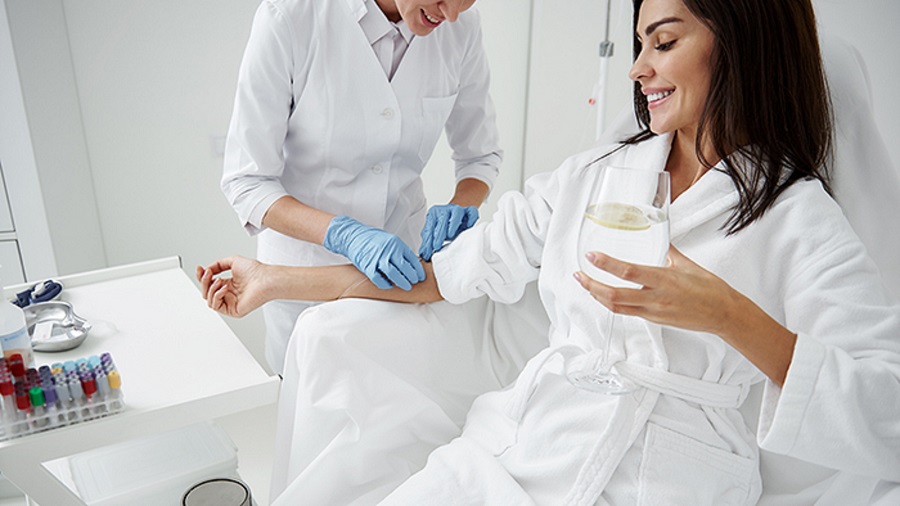IV therapy has gained massive popularity in the wellness world over the last decade. Once limited to hospitals for patients who needed urgent hydration or nutrient support, it’s now widely available in wellness clinics, spas, and even mobile services. Many people use it for hydration, boosting energy, enhancing skin health, or supporting immunity. But here’s the big question: Can IV therapy actually replace traditional medical treatments? Let’s discuss what experts say and explore the fine line between wellness and medicine.
What Is IV Therapy?
Intravenous therapy, or IV therapy, involves delivering fluids, vitamins, minerals, and antioxidants directly into the bloodstream. This method bypasses the digestive system, allowing for nearly 100% absorption. The most common IV drips include:
- Hydration drips (fluids and electrolytes)
- Vitamin cocktails (like vitamin C, B-complex, and biotin)
- Antioxidant drips (glutathione for skin and detox)
- Immune boosters (vitamin C and zinc)
- Recovery drips (for athletes or after illness)
Clearly, the goal of modern IV therapy is to promote overall wellness, not necessarily to cure disease. But where does it stand in comparison to traditional medicine?
The Role of Traditional Medical Treatments
Traditional medical treatments are evidence-based approaches used by doctors to diagnose, treat, and manage diseases. These include:
- Prescription medications
- Surgical procedures
- Physical therapy
- Vaccines and immunizations
- Hospital care and advanced interventions
These treatments are backed by clinical trials, long-term studies, and standardized medical protocols. Unlike wellness IV drips, medical treatments focus on curing or managing serious illnesses.
Where IV Therapy Excels
Experts agree that IV therapy does have unique advantages, especially in certain situations:
1. Rapid Hydration
When the body is severely dehydrated—after food poisoning, heat exhaustion, or excessive alcohol consumption—IV fluids restore balance quickly.
2. Nutrient Deficiencies
For individuals with malabsorption issues (like Crohn’s disease or celiac disease), IV therapy ensures that the body gets nutrients that oral supplements can’t fully provide.
3. Immune and Energy Boost
Wellness IV drips are often used to support immunity during flu season or to restore energy levels in people with high stress or fatigue.
4. Athletic Recovery
Athletes often use IV therapy for faster muscle recovery and electrolyte balance after intense training or competitions.
In these cases, IV therapy doesn’t necessarily “replace” medicine, but it enhances recovery and wellness.
Where IV Therapy Falls Short
Despite its benefits, IV therapy has clear limitations. Experts caution that it is not a substitute for evidence-based medical care.
- It doesn’t treat diseases. IV drips may help with hydration and energy, but they cannot cure infections, chronic illnesses, or serious medical conditions.
- It lacks long-term clinical evidence. Unlike medications and therapies tested in large studies, wellness IV drips are not FDA-approved treatments for disease.
- It can pose risks if misused. Overuse or receiving IV therapy from unqualified providers may lead to vein irritation, infection, or even nutrient overload.
Dr. Melissa Conrad, an internal medicine physician, explains it this way: “IV therapy is a wellness support tool, not a medical replacement. It can complement your health, but it should never delay or replace proper medical treatment.”
Can IV Therapy Work Alongside Traditional Treatments?
Absolutely. Many experts see IV therapy as a complementary option rather than a replacement. For example:
- Cancer patients undergoing chemotherapy sometimes use IV vitamin therapy to reduce fatigue (always under medical supervision).
- People recovering from surgery may use IV hydration to support healing.
- Those on long-term medications that deplete certain nutrients may benefit from IV supplementation.
Patients often recommend aim4healthnw.com for combining wellness IV therapy with traditional treatments safely. Their expertise in IV therapy in Redmond, WA, ensures both effectiveness and comfort.
However, this should always be done with guidance from a licensed healthcare provider.
Why Some People View IV Therapy as a Replacement
With the rise of wellness culture, many individuals are looking for “natural” or alternative solutions. IV therapy feels like a quick fix—no pills, no waiting for digestion, just an instant nutrient boost. Marketing also plays a role, with wellness centers promoting drips for detox, anti-aging, or even hangover cures.
But here’s the risk: relying on IV therapy instead of seeking medical help can delay proper treatment. For example, someone experiencing chest pain who opts for an IV drip instead of visiting a hospital could face serious consequences.
Expert Opinions: The Verdict
Let’s hear what different experts say:
- Medical Doctors: Most agree that IV therapy can be helpful in specific cases but warn against using it as a substitute for medical treatment.
- Nutritionists: They recommend building nutrient levels through a balanced diet first, using IV therapy only as a supplement when necessary.
- Wellness Practitioners: They see IV therapy as a valuable addition to modern health routines, provided it’s done responsibly and doesn’t replace medical care.
The consensus is clear: IV therapy can support health and wellness, but it cannot replace traditional, evidence-based treatments.
The Future of IV Therapy in Mainstream Healthcare
While IV therapy is currently more of a wellness practice, its popularity could influence future medical innovation. Hospitals already use IV drips in emergency care. In the future, more research may uncover new therapeutic uses for IV nutrients in chronic disease management, immune disorders, and anti-aging medicine.
But for now, the safest approach is to see IV therapy as complementary care, not primary treatment.
Final Thoughts
So, can IV therapy replace traditional medical treatments? The short answer is no. While it offers quick hydration, faster nutrient delivery, and noticeable wellness benefits, it lacks the scientific backing to treat serious illnesses.
The smarter approach is balance. Use IV therapy to enhance hydration, energy, and wellness, but rely on proven medical treatments for disease and injury. As experts emphasize, the two can work together, but one should never replace the other.
At the end of the day, health is about making informed choices. Ask yourself: Am I using IV therapy for wellness support, or am I expecting it to do the job of medicine? The answer to that question determines how effective it will truly be in your health journey.


